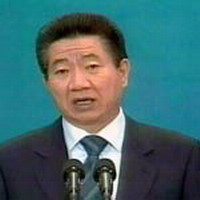Family of shooter at Virginia Tech struggled in South Korea

The family of the shooter at Virginia Tech had struggled in South Korea and emigrated to America to seek a better life, a newspaper reported Wednesday.
The shooter was identified as Cho Seung-Hui, a senior in the university's English department, who had been living in the United States since 1992. The shooting rampage, the deadliest in modern U.S. history, left 33 dead including Cho.
South Korea's largest newspaper, Chosun Ilbo, reported that Cho's family was poor when they lived in a Seoul suburb and decided to emigrate to seek a better life.
The family lived in a rented basement apartment, usually the cheapest unit in a multi-apartment building, the newspaper reported, quoting building owner Lim Bong-ae, 67. Police identified the suspect's father as Cho Seong-tae, 61.
"I didn't know what (Cho's father) did for a living. But they lived a poor life," Lim told the newspaper. "While emigrating, (Cho's father) said they were going to America because it is difficult to live here and that it's better to live in a place where he is unknown."
The small apartment where the family lived is now vacant and its front door was left unlocked Wednesday. Mildew stains marked the pale blue walls of the three-room residence, no larger than 40 square meters (430 square feet).
At the Shinchang Elementary School that Cho attended for first grade and half of second grade, there were no records of the former student other than that he left school on Aug. 19, 1992, officials said. Cho's former homeroom teacher is no longer working at the school and other teachers did not remember Cho.
Meanwhile, South Korean President Roh Moo-hyun held a special meeting with aides Wednesday to discuss the shooting, as the public expressed shame over a South Korean citizen being identified as the gunman.
"I and our people cannot contain our feelings of huge shock and grief," Roh said during a news conference. "I pray for the souls of those killed and offer words of comfort from my heart for those injured, the bereaved families and the U.S. people."
It was the third time that Roh has offered condolences since Tuesday. Roh also sent a similar message Wednesday to U.S. President George W. Bush, his office said.
The case topped the front pages of nearly all South Korean newspapers Wednesday, which also voiced worries that the incident may trigger racial hatred in the U.S. and worsen relations between the strong allies.
"We hope that this incident won't create discrimination and prejudice against people of South Korean or Asian origin," the Hankyoreh newspaper said in an editorial.
A sense of despair prevailed among South Korean public that sent an outpouring of sympathy online.
"I'm too shameful that I'm a South Korean," wrote an Internet user identified only by the ID iknijmik on the country's top Web portal site, Naver _ among hundreds of messages on the issue. "As a South Korean, I feel apologetic to the Virginia Tech victims."
A South Korean also launched an online campaign Tuesday to offer condolences to the victims, setting up a Web page where users left more than 8,500 messages by Wednesday.
"I feel distressed to learn that it was a South Korean that threw the world into shock," said the site's operator, identified only by the ID Hangukin, which means South Korean. "I pray for the souls of all those killed and let's say to them that we, as South Koreans, regret" the tragedy.
Some college students voiced concern the case may taint South Korea's image.
"This is what an individual did wrong and nationality isn't important," said Park Joon-beom, a freshman at Seoul's Yonsei University. "I don't think South Koreans deserve blame."
South Korea has more students studying in the United States than any other country, according to U.S. Immigration and Customs Enforcement.
There were 93,728 South Korean students in the U.S. at the end of last year, or 14.9 percent of the total, ahead of India at 76,708 and China at 60,850, according to a February report from the agency.
South Korea remains technically at war with neighboring North Korea but citizens are banned from privately owning guns. However, it has not been immune from shooting rampages.
South Korea was the scene of one of the world's deadliest shooting sprees, when police officer Woo Beom-gon went on an eight-hour overnight rampage in 1982 in the southeastern village of Euiryeong after a quarrel with his live-in girlfriend and drinking, killing 55 people and wounding 35 others.
In 2005, a military conscript believed to be angered by taunts from senior officers killed eight fellow soldiers, throwing a grenade into a barracks where his comrades were sleeping and firing a hail of bullets.
Subscribe to Pravda.Ru Telegram channel, Facebook, RSS!


